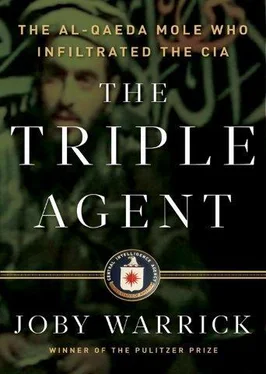Just as the raid was set to begin, a scuffle broke out between some of the Mukhabarat’s officers and a group of young men walking home from a party. The men gathered around the strange car straddling the alley and began hectoring the driver for blocking the street. Another plainclothes officer arrived, and soon there were shouts and shoving.
I’m calling the police , one of the men was yelling.
Inside the house, the commotion roused the suspect’s father, Khalil al-Balawi. The sixty-six-year-old retired schoolteacher had dozed off while reading on the living room sofa and awoke to angry voices just outside his front window. The bearded pensioner peered through the curtain and, seeing nothing, tied his robe and hobbled to the front door. He had opened it only a crack when the door burst inward, flinging him back. Three figures in leather coats brushed past him without a word, while a fourth moved toward the old man as though to block him.
Balawi, still foggy, guessed that the intruders were trying to escape the fight under way in the street. But now three of the men were bounding up the stairs, toward the apartments where Balawi’s adult children lived with their families. He started to protest but felt a viselike grip on his shoulder. It was a large man in a black sweater.
“Mukhabarat,” the man said quietly, using the Arabic term for the spy service known officially as the General Intelligence Department, or GID. He handed Balawi a creased document. “We’re here for Humam.”
Balawi felt his knees buckle. Was he dreaming? From upstairs came desperate sounds: A child’s piercing scream. Bangs and thumps. His daughter-in-law’s voice shouting, then pleading, then wailing. Finally a single thought crystallized in his brain: This is a mistake. It was the wrong house, the wrong Humam. His son was a healer, not a criminal.
“Whatever you’re looking for—it doesn’t exist!” he stammered to the captain. “We don’t have weapons or drugs. We don’t keep anything against the law!”
The officer’s hazel eyes met the old man’s with a look that seemed to convey sympathy, but he said nothing. Khalil al-Balawi’s mind raced. Was it possible that Humam had a secret life? Was he stealing from the clinic? No, not possible, he thought. Humam is a homebody. He has no use for money. He doesn’t go to the nightclubs in the Western hotels downtown. He barely leaves the house .
More shouts and thumps. Then two of the officers thundered down the steps with what Khalil al-Balawi recognized as his son’s belongings. One carried a desktop computer, and the other was struggling with a box crammed with books, papers, and a rack of computer disks. The first man set down the computer and presented the elderly Balawi with a handwritten list under a heading that read, “Prohibited items.” It was an inventory of the electronics and paper records seized as evidence.
“Sign here to say we didn’t break anything,” the man ordered.
Khalil al-Balawi was wide awake now, and his skin flushed beneath his red beard. “Where are you taking him? What’s this about?” he demanded.
“You can ask about him tomorrow,” the officer replied, “at the Mukhabarat.”
The old man stared at the pen that had been thrust into his hand, then looked up to see his son being led down the stairs by one of the officers. Humam Khalil al-Balawi was wearing a knee-length kurta shirt, pajama pants, and he was walking slowly, eyes fixed on the steps. At five feet seven he was slightly taller than his father, but narrow at the waist and shoulders, and he had the delicate skin of a man who keeps company with books and computers. His brown curls and wispy beard were matted from sleep, so that he looked more like a scrawny teenager than an accomplished physician with a practice and two kids of his own.
At the bottom of the staircase the procession stopped. To his father, the younger Balawi seemed oddly, inexplicably detached, as though he were sleepwalking. Then he caught his son’s eyes. They were inordinately large and as soft and brown as a doe’s. They were also incapable of hiding emotion, quick to betray fear or anger or whatever passion Humam happened to be feeling. But on this day they were ablaze with something the older man could not immediately grasp. It wasn’t fear, or nervousness, or even anger, exactly, but something more akin to contempt, like a champion boxer who had just taken a sucker punch.
“It was defiance I saw,” the elder Balawi said afterward. “I knew the look. It was very Humam. ”
Neither man spoke. There was a brief jostling at the door, and then the old man watched the officers shove his son into the back of one of the cars. In an instant, Dr. Humam al-Balawi, the gifted scholar and pediatrician who had dreamed of practicing in the United States, disappeared behind tinted glass, along with his reputation and all traces of his former life. From now on, no matter what else happened, he would live his life as a man who had been marked by the Mukhabarat.
The only unknown was where precisely his path would end. Humam could choose defiance and see his career destroyed, the family name tarnished, and his children reduced to poverty. Or he could cooperate and endure the ignominy of becoming an informant for the government. Some Jordanians who chose the latter course had gone slowly insane, isolated from friends and mistrusted by coworkers. Others had fled the country, and still others had simply disappeared behind the walls of the Mukhabarat’s fortresslike headquarters, never to be heard from again.
Khalil al-Balawi shivered as he stood in the doorway in his thin robe, watching the slow-motion demolition of his son’s life and his own hopes for a quietly comfortable old age. He strained his eyes, hoping for a last glimpse, but the windows of the dark sedan revealed nothing. The lead car with Humam inside made a tight U-turn in the alley, rounded the corner, and was gone.
“Your handcuffs will be as silver bracelets. The hangman’s noose will be a medal of honor.”
The Arabic characters skittered across the computer screen as Humam al-Balawi typed, pressing the keys softly to avoid waking his wife and two girls asleep in the room next door. It was June 2007, nineteen months before his arrest, and he was doing the thing he loved most. In a few hours it would be daylight and he would be on his way to the children’s clinic to prescribe antibiotics and treat tummy aches and fevers. But at this moment, in the quiet of the family kitchen, he was Abu Dujana al-Khorasani, cyberwarrior for Islam and scourge of the Americans and their Arab lackeys around the world.
“Brothers, download these videos until your Internet cable gets overheated because of how hot the clips are,” Balawi wrote, pausing to insert coding that would allow readers to view a collage of Iraqi insurgent attacks on U.S. troops whose Humvees erupted in clouds of flame, smoke, and shrapnel. “Watch how the Americans get killed as if they were in PlayStation video games.”
Balawi read the sentences back to himself and, satisfied, clicked a button to transmit. In seconds, his column would appear as the billboard item on the Web site al-Hesbah, one of the leading outlets for radical Islamic views and teachings in the Arabic-speaking world.
“Abu Dujana” was a mere invention, a fake identity created by Balawi initially so he could express himself in chat rooms without fear of getting arrested. But over time the character had evolved a personality of its own. Where the young physician was respectful and reserved, Abu Dujana was aggressive, blunt, and bitingly sarcastic, an evil twin with a devilish sense of humor. He was also an instant hit. New postings by Abu Dujana al-Khorasani were among the most widely read items on al-Hesbah and received the most comments. Soon he was asked to serve as moderator of the Web site’s discussion groups, a position that put him in charge of the daily online conversation and gave him a showcase for his own columns.
Читать дальше












